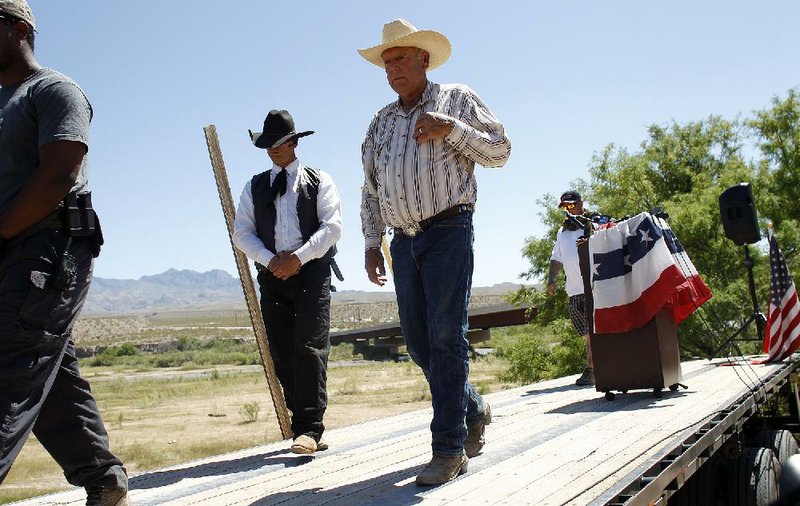Sen. Rand Paul, R-Ky., a potential 2016 presidential candidate, joined a line of Republican and Democratic leaders Thursday in denouncing Cliven Bundy, the Nevada rancher at the center of a standoff with the federal government over land use, for suggesting that blacks might have been better off in slavery.
“His remarks on race are offensive, and I wholeheartedly disagree with him,” Paul said in a statement.
The senator had earlier offered support for Bundy’s case as the rancher resisted the federal Bureau of Land Management when it sought to confiscate his cattle because he was not paying fees for their grazing on public land.
The government backed off after federal authorities encountered hundreds of Bundy supporters, many carrying guns, who had flocked to his ranch in Bunkerville, Nev., as the dispute intensified.
On Thursday, Paul joined other Republican leaders -among them, Sen. Dean Heller of Nevada - in assailing Bundy for comments published online by The New York Times on Wednesday evening after they had previously expressed support for the rancher.
Bundy, in the course of 55 minutes of remarks to supporters Saturday, talked about seeing blacks gathered outside public-housing projects in North Las Vegas, Nev.
“And because they were basically on government subsidy, so now what do they do?” he asked. “They abort their young children, they put their young men in jail, because they never learned how to pick cotton. And I’ve often wondered, are they better off as slaves, picking cotton and having a family life and doing things, or are they better off under government subsidy?”
A spokesman for Heller, who also had expressed support for Bundy’s followers, said the senator “completely disagrees with Mr. Bundy’s appalling and racist statements, and condemns them in the most strenuous way.”
Bundy has been championed by some Fox News commentators, though there were signs that they were distancing themselves after his remarks were published.
Greta Van Susteren of Fox News posted a link on her blog to the Times article under the headline, “Let me make this plain: I condemn what Cliven Bundy said about African-Americans.”
The Nevada Democratic Party issued a statement shortly after the article was published, denouncing Republicans for having aligned themselves with Bundy.
“These comments are reprehensible, and every Republican politician in the state of Nevada who tried to latch on to Cliven Bundy’s new found celebrity with Tea Partiers and the militia movement should be ashamed of their actions,” it said.
Bundy’s standoff with federal rangers - propelled into the national spotlight in part by steady coverage by Fox News - has highlighted divisions over the power of the federal government and the rights of landowners in places such as Nevada, where resentment of Washington and its sprawling ownership of Western land has long run deep.
Bundy, whose family has grazed cattle in Bunkerville, 80 miles northeast of Las Vegas, since it homesteaded in the 1870s, owes the government more than $1 million in grazing fees.
He stopped paying after the bureau ordered him to restrict the periods when his herd roamed the 600,000-acre Gold Butte area as part of an effort to protect the endangered desert tortoise.
The federal government owns 85 percent of the land in Nevada, a statistic repeatedly noted by Bundy’s supporters as they denounced the the government’s attempt to seize Bundy’s cattle.
Six died during the attempt to collect them.
Bundy’s case happened to heat up around the time that Paul, building the foundation for a presidential campaign, struck a chord with some members of the Republican Party with warnings about governmental overreach.
Paul’s latest book is titled Government Bullies: How Everyday Americans Are Being Harassed, Abused and Imprisoned by the Feds.
In the Bundy standoff, Paul has criticized the federal government for overreaching with its use of environmental regulations but cautioned against any violence or lawbreaking.
Information for this article was contributed by Lynette Curtis of The New York Times.
Front Section, Pages 4 on 04/25/2014
